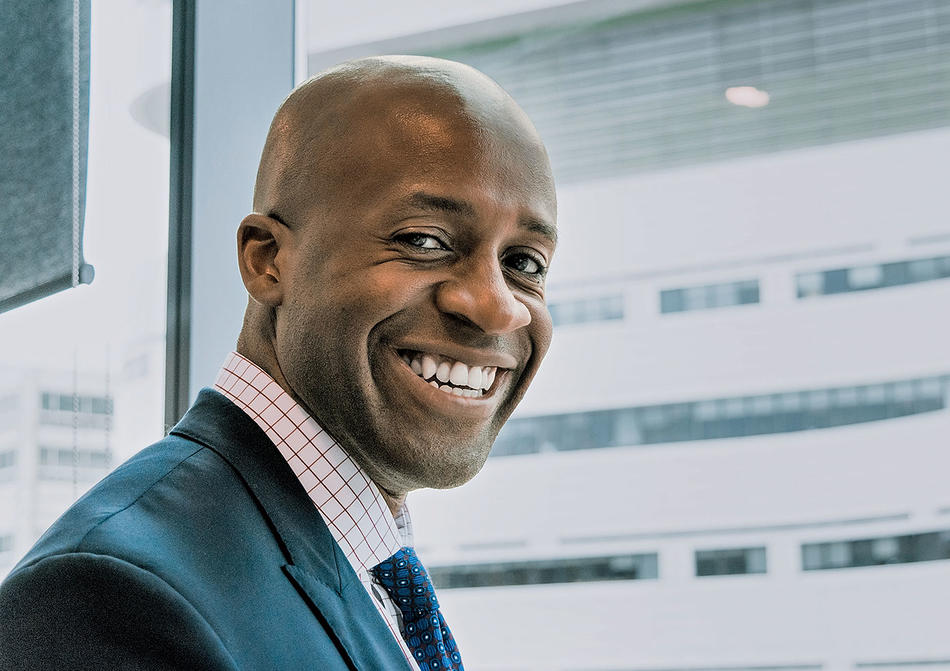Benedict Nwachukwu ’08CC knows how to keep professional athletes healthy. In addition to working as a sports-medicine surgeon and codirector of research for the Sports Medicine Institute at the Hospital for Special Surgery in New York, he has been a team physician for the New York Red Bulls, the Chicago Bulls, and the Chicago White Sox. But this past fall, Nwachukwu masked up for a different kind of challenge — serving as an onsite physician for the National Basketball Association’s experimental “bubble” season.
“It meant putting the rest of my life and work on pause for several weeks,” Nwachukwu says. “But it also felt like a once-in-a-lifetime opportunity to help bring the sport back for players and fans.”
In August, after quarantining for two weeks, Nwachukwu moved into the now-legendary NBA bubble — a campus within Walt Disney World, just outside Orlando, Florida, where 341 players and around a thousand staff members lived communally while playing a truncated season. Nwachukwu started every day with a rapid COVID-19 test and was then allowed to move freely around the bubble. After meeting with players and monitoring both injuries and any potential COVID-19 infections, Nwachukwu would spend the rest of the day on duty at games — sometimes for up to ten hours at a time.
“Usually as a team physician, I’d be covering a few games a week,” Nwachukwu says. “In the bubble, it was a few games a day. The level of intensity presented different challenges for the players and made it more interesting for me as a doctor.”
Nwachukwu, who played varsity basketball at Columbia, says that he went into sports medicine because he relishes the job of helping people get back to what they do best. A bonus to working in the bubble was getting more time with his patients and being able to see how his work impacted their performance. “We were all living together, so not only was I seeing them play every day, but I could check in with them over dinner,” he says.
But though Nwachukwu caught some exciting action on the court, he says that the most memorable experience had nothing to do with jump shots or buzzer beaters. In late August, as a new wave of protests raged across the country following the shooting of Jacob Blake in Kenosha, Wisconsin, Nwachukwu was assigned to cover an afternoon game between the Orlando Magic and the Milwaukee Bucks. Because he had been particularly busy for the previous few days, Nwachukwu hadn’t yet heard about the shooting and was shocked when instead of starting the game, the Bucks remained in the locker room in protest.
“The players were clearly communicating to the world that there are more important things than basketball,” Nwachukwu says. “Before that game, the atmosphere inside the bubble was jubilant. After that, it took on a more somber tone. People had to refocus their energy on the bigger picture, which felt entirely appropriate.”
For Nwachukwu, a Black man working in a field in which he is a clear minority, the protests were especially moving. “Aside from the players themselves, the bubble was not diverse. I felt tremendous solidarity and pride when I saw the players use their platforms for change,” Nwachukwu says. “I remember at one of the early games, a fellow physician asked me what I would write on my jersey if I was a player. My response was simple: ‘Stop Killing Us.’”
Many have heralded the NBA bubble as an example of how sports teams can safely resume play during the pandemic. But Nwachukwu says that he hopes the season will have a bigger impact on the world of professional sports. “I hope that people look to the NBA not only for how to behave during a health crisis, but also a social one,” he says. “It should be a model for how to bring people together to work for justice.”
This article appears in the Winter 2020-21 print issue of Columbia Magazine with the title "Dunking on COVID."




